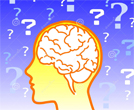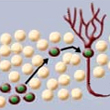Monday, 1 February 2016
Two Scientific Models Called into Question

Every scientific theory consists of models that can be used to generate hypotheses that can be tested by observation or experimentation. If the observations or experimental results are inconsistent with what the models predict, then the models themselves must be called into question. Recent developments in neuroscience provide two examples of models that are going to have to be adjusted to such “abnormal data”, as Thomas Kuhn has called them. (more…)
From Thought to Language, Mental Disorders | No comments
Monday, 17 December 2012
Neurogenesis and Depression
 The processes leading to the many different illnesses that can affect people’s psychic equilibrium are still hotly debated. Often, these processes involve multiple contributing factors which is why there are so many different hypotheses about them. In the case of depression, for example, one of the best known is the monoamine hypothesis, which associates the disease with underactivity of certain neurotransmitters. such as serotonin.
The processes leading to the many different illnesses that can affect people’s psychic equilibrium are still hotly debated. Often, these processes involve multiple contributing factors which is why there are so many different hypotheses about them. In the case of depression, for example, one of the best known is the monoamine hypothesis, which associates the disease with underactivity of certain neurotransmitters. such as serotonin.
Several research laboratories are now working on a more recent hypothesis about the cause of depression, involving a phenomenon that was first confirmed in humans in the late 1990s: neurogenesis, meaning the birth of new neurons in the adult brain. The starting point for this hypothesis is that these young neurons seem to show greater plasticity and are found only in certain parts of the brain, such as the dentate gyrus of the hippocampus, that are associated with emotions. (more…)
Memory and the Brain, Mental Disorders | 1 comment
Monday, 4 June 2012
Stress, Prefrontal Cortex Inhibition, and Depression
 Exposure to chronic stress has many harmful effects, including effects on our cognition and mental health. The June 2009 edition of Nature Reviews Neuroscience presents several articles summarizing the most recent research findings on this subject.
Exposure to chronic stress has many harmful effects, including effects on our cognition and mental health. The June 2009 edition of Nature Reviews Neuroscience presents several articles summarizing the most recent research findings on this subject.
One of these articles, by Amy F. T. Arnsten, shows how stress inhibits thinking, planning, and control activity in the prefrontal cortex, while strengthening the activity of the rapid reflex pathways connected to the amygdala and the subcortical structures associated with it. (more…)
Mental Disorders | Comments Closed
Monday, 7 May 2012
Insomnia as a Treatment for Depression
 Lack of sleep has a beneficial effect on depression. However counterintuitive this finding may seem, it has been well documented in more than 75 studies published over the past 40 years. One of the reasons that sleep deprivation is not used more extensively in the treatment of depression is that prolonged insomnia can also have significant negative effects on cognitive functioning. Another reason is that insomnia-induced improvements in mood dissipate rapidly when the individuals eventually and inevitably catch up on their sleep. (more…)
Lack of sleep has a beneficial effect on depression. However counterintuitive this finding may seem, it has been well documented in more than 75 studies published over the past 40 years. One of the reasons that sleep deprivation is not used more extensively in the treatment of depression is that prolonged insomnia can also have significant negative effects on cognitive functioning. Another reason is that insomnia-induced improvements in mood dissipate rapidly when the individuals eventually and inevitably catch up on their sleep. (more…)
Mental Disorders | Comments Closed







